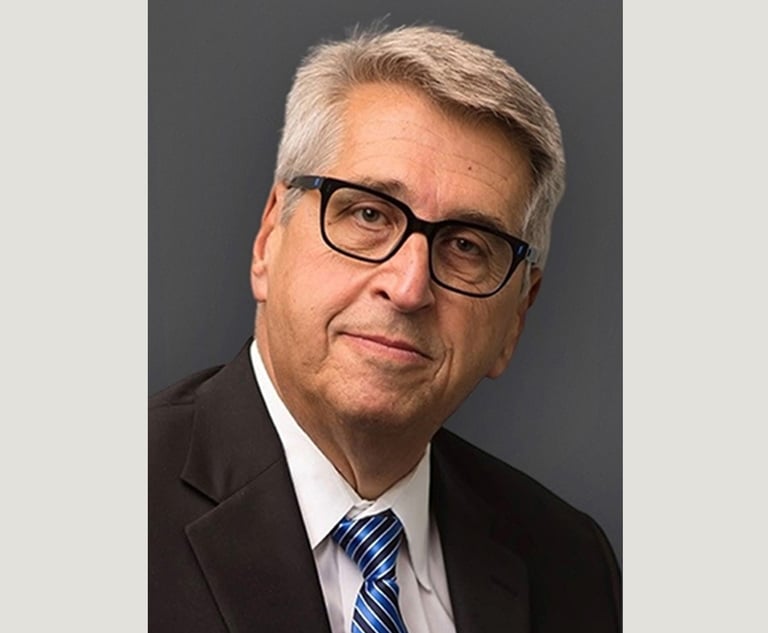Mamas, Don't Let Your Babies Grow Up to be Executors
Estate planning requires a client to make numerous decisions, and some of those decisions are given a lot of attention — such as, “Who should…
March 01, 2018 at 12:00 AM
5 minute read

Estate planning requires a client to make numerous decisions, and some of those decisions are given a lot of attention — such as, “Who should inherit my property?” or “Should I have a trust to avoid probate?” But one decision in particular rarely receives the attention it deserves, especially considering the risks and consequences that go with it.
Choosing an executor or trustee is a decision that is often downplayed by attorneys and clients alike, usually resulting in the selection of family members with little consideration as to whether the person is equipped and prepared to handle the responsibilities of the position. Considering a family member or loved one as an executor of an estate or trustee of a trust is understandable: It is assumed that a family member would “do the right thing” or would be offended if an outsider was chosen over a loved one. Estate planning clients are inclined to believe that family is a safe and economical choice. Statistically, though, family is just as likely — if not more likely — as nonfamily members to financially exploit relatives, and litigation costs can easily eat up the initial “savings” of not choosing a third-party professional executor or trustee. Aside from theft and exploitation issues, having certain family members control other family members' inheritances can irreparably damage familial relationships long revered as indestructible, and worse, lead to estrangement.
Estate planning clients must understand that the appointment of a family member or loved one as an executor or trustee not only confers broad and sweeping powers but also stringent fiduciary duties. Many families these days are extremely complicated and if the assets of the estate or trust warrant it, the client should consider whether the appointment of a third-party or corporate trustee makes sense. The expenses typically associated with the services provided by corporate or professional fiduciaries often outweigh the costs — both emotional and financial — associated with prolonged litigation related to the administration of the estate or trust. Nevertheless, if a professional or corporate fiduciary is not an option or the client insists on naming an individual, here are some considerations he or she should sleep on before a making a final nomination:
Executors and trustees may have personal liability. Executors and trustees can be personally liable for their actions, and the client should consider that he or she is asking a lot of the loved one even if the estate is considered small or uncomplicated. Serving in these roles can be a huge burden — particularly in situations involving strong personalities or a bunch of assets that do not have significant monetary value but are tremendously sentimental to the family.
Executors and trustees must communicate. An executor or trustee must operate with transparency. Families do not always get along, especially in times of stress like the immediate months following the death of a loved one, but dysfunction and drama do not excuse a failure to communicate with beneficiaries. Likewise, executors and trustees must keep complete books and records and be ready to provide accountings to beneficiaries at certain times or on demand. As a result, executors and trustees must always be personable and organized. A nominee who is just a “people person” or just a “numbers cruncher who is good with money” is not enough — an executor and trustee must have both characteristics.
Executors and trustees must manage estate assets and property prudently. Not only does this mean that property must be securely maintained, it also means that the property must be appropriately invested so that the varying interests of beneficiaries can be managed. Prudent management includes insuring property, diversifying investments, preparing tax returns, maintaining property tax exemptions, and balancing an investment portfolio. This can be an overwhelming task for executors and trustees who are already busy or are not business-minded.
Executors and trustees must be impartial and put others first. Executors and trustees must put the interests of the beneficiaries before their own interests. Likewise, an executor or trustee usually cannot play favorites or treat certain classes of beneficiaries with deference over others — even if the estate plan seems unfair or one beneficiary seems less responsible than other beneficiaries.
Every executor and trustee should give painstaking attention to detail, exercise patience and restraint, be particularly organized, and be prepared to work extremely hard with little or no gratitude (and compensation) in return. These characteristics minimize the risk of fiduciary litigation while maximizing the estate plan's original intent. On the other hand, if the nominated executor or trustee fails to possess these characteristics, then the client runs the risk that the person intended to administer the estate will be removed and potentially replaced by a third party the client sought to avoid in the first place. As a result, estate planning clients should honestly evaluate those who are nominated to serve as executor or trustee in estate planning documents. For many family members, not being selected an executor or trustee just might be the biggest favor they could receive.
Aaron Dobbs is a shareholder in the Houston and Sugar Land offices of Roberts Markel Weinberg Butler Hailey PC where he leads the firm's trusts, wills and estates practice. He is board certified in estate planning and probate law by the Texas Board of Legal Specialization and assists clients with estate planning, estate and trust administration and fiduciary litigation.
This content has been archived. It is available through our partners, LexisNexis® and Bloomberg Law.
To view this content, please continue to their sites.
Not a Lexis Subscriber?
Subscribe Now
Not a Bloomberg Law Subscriber?
Subscribe Now
NOT FOR REPRINT
© 2025 ALM Global, LLC, All Rights Reserved. Request academic re-use from www.copyright.com. All other uses, submit a request to [email protected]. For more information visit Asset & Logo Licensing.
You Might Like
View All
From Hospital Bed to Legal Insights: Lessons in Life, Law, and Lawyering
6 minute read

Nondisparagement Clauses in Divorce: Balancing Family Harmony and Free Speech
6 minute readTrending Stories
- 1Trade Wars: Five Tips for Legal Teams to Manage Tariffs and Trade in Trump II
- 2Balancing Attorney-Client Privilege With a Lawyer’s Right to Defend Against Allegations of Wrongdoing
- 3Public Interest Calendar of Events
- 4Sharpening Residential Insurance Fraud Defense Strategies: Insights for Insurers to Mitigate Risk in 2025
- 5Reversal of Fortune: Restoring Owners’ Equity Under New Jersey’s Tax Sale Law
Who Got The Work
J. Brugh Lower of Gibbons has entered an appearance for industrial equipment supplier Devco Corporation in a pending trademark infringement lawsuit. The suit, accusing the defendant of selling knock-off Graco products, was filed Dec. 18 in New Jersey District Court by Rivkin Radler on behalf of Graco Inc. and Graco Minnesota. The case, assigned to U.S. District Judge Zahid N. Quraishi, is 3:24-cv-11294, Graco Inc. et al v. Devco Corporation.
Who Got The Work
Rebecca Maller-Stein and Kent A. Yalowitz of Arnold & Porter Kaye Scholer have entered their appearances for Hanaco Venture Capital and its executives, Lior Prosor and David Frankel, in a pending securities lawsuit. The action, filed on Dec. 24 in New York Southern District Court by Zell, Aron & Co. on behalf of Goldeneye Advisors, accuses the defendants of negligently and fraudulently managing the plaintiff's $1 million investment. The case, assigned to U.S. District Judge Vernon S. Broderick, is 1:24-cv-09918, Goldeneye Advisors, LLC v. Hanaco Venture Capital, Ltd. et al.
Who Got The Work
Attorneys from A&O Shearman has stepped in as defense counsel for Toronto-Dominion Bank and other defendants in a pending securities class action. The suit, filed Dec. 11 in New York Southern District Court by Bleichmar Fonti & Auld, accuses the defendants of concealing the bank's 'pervasive' deficiencies in regards to its compliance with the Bank Secrecy Act and the quality of its anti-money laundering controls. The case, assigned to U.S. District Judge Arun Subramanian, is 1:24-cv-09445, Gonzalez v. The Toronto-Dominion Bank et al.
Who Got The Work
Crown Castle International, a Pennsylvania company providing shared communications infrastructure, has turned to Luke D. Wolf of Gordon Rees Scully Mansukhani to fend off a pending breach-of-contract lawsuit. The court action, filed Nov. 25 in Michigan Eastern District Court by Hooper Hathaway PC on behalf of The Town Residences LLC, accuses Crown Castle of failing to transfer approximately $30,000 in utility payments from T-Mobile in breach of a roof-top lease and assignment agreement. The case, assigned to U.S. District Judge Susan K. Declercq, is 2:24-cv-13131, The Town Residences LLC v. T-Mobile US, Inc. et al.
Who Got The Work
Wilfred P. Coronato and Daniel M. Schwartz of McCarter & English have stepped in as defense counsel to Electrolux Home Products Inc. in a pending product liability lawsuit. The court action, filed Nov. 26 in New York Eastern District Court by Poulos Lopiccolo PC and Nagel Rice LLP on behalf of David Stern, alleges that the defendant's refrigerators’ drawers and shelving repeatedly break and fall apart within months after purchase. The case, assigned to U.S. District Judge Joan M. Azrack, is 2:24-cv-08204, Stern v. Electrolux Home Products, Inc.
Featured Firms
Law Offices of Gary Martin Hays & Associates, P.C.
(470) 294-1674
Law Offices of Mark E. Salomone
(857) 444-6468
Smith & Hassler
(713) 739-1250







